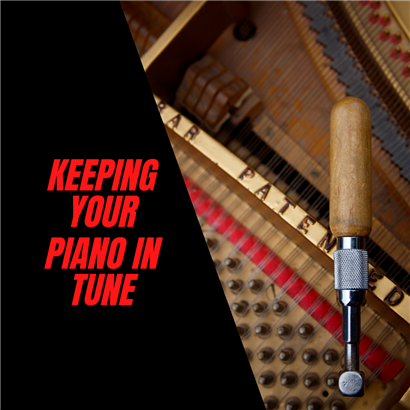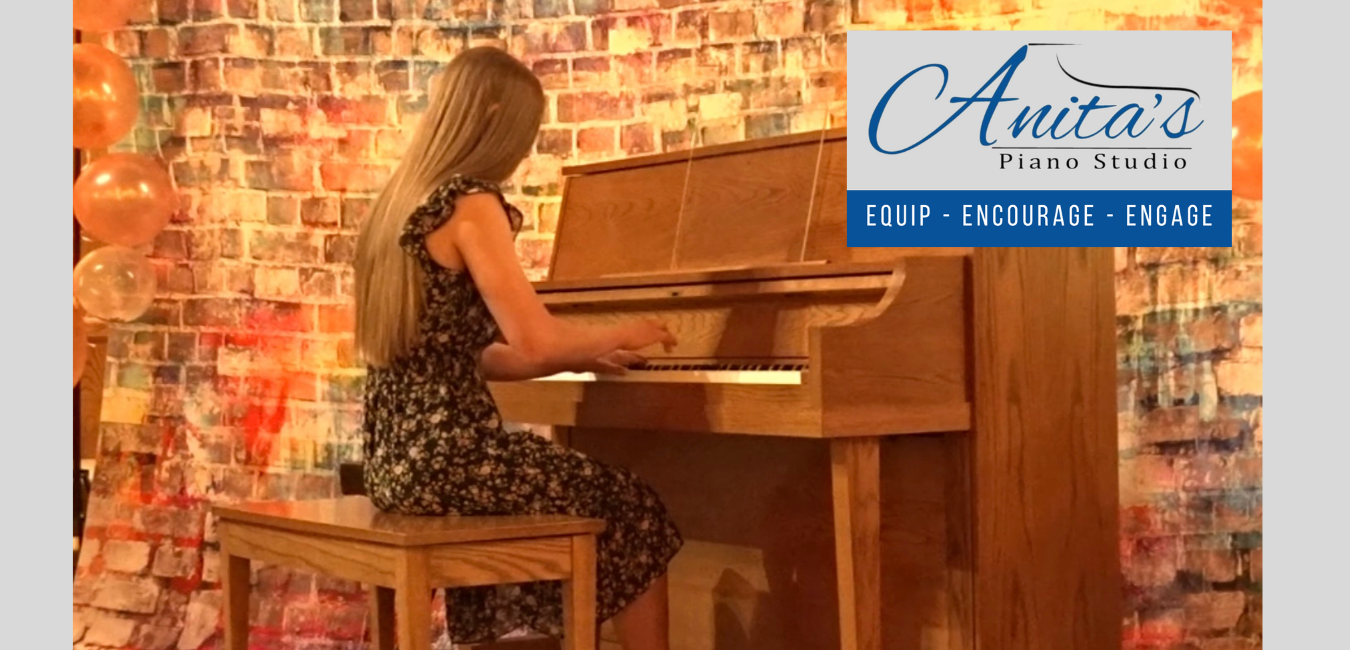Why Keeping Your Acoustic Piano in Tune is SO IMPORTANT
Monday, November 11, 2024 by Anita Byers | Your Home Piano

It's fall and that is a great time to make sure your acoustic piano is in tune. Over the years, I often have seen a direct correlation between students quitting and the condition of the instrument they are playing at home. If the home instrument is out of tune or has broken keys, this can be terribly frustrating for a student and they will not want to practice. Actually as a musician, an out of tune piano is just downright painful to listen to.
"It is important for those learning to play the piano to have an instrument that is in tune so they can correctly learn the pitches. If a piano player learns to play with incorrect pitches, it will hinder his or her ability to play a tuned piano, because the pitch will sound off to them.
Regular piano tuning can give those who are learning to play the piano a boost of confidence, because it’s exciting to play a piano that is in tune and sounds good. Having an in-tune piano helps kids stick with the piano and enjoy learning to play it. It’s hard to be motivated to learn to play the piano when you don’t know if you are making a mistake or if the piano is just out of tune. If you properly care for your instrument, it will bless your life for years to come."https://www.deseretindustries.org/blog/why-its-important-to-tune-your-piano
Just as a car needs maintenance and the oil changed, an acoustic piano must have regular tunings. If tuning has been neglected, it is going to take awhile for them to hold a tune and sadly if the piano has been very neglected in it’s past and has some age on it, it may never hold tune.
Here are names of tuners I have used. If you have broken strings or other repairs that need to happen on your piano, I'd recommend David Vanderhoofven who is a certified piano technician from Joplin.
David Vanderhoofven 417.781.3965 or Dan Keller 417.667.6208 or 417-321-7722
Here’s a great video to watch! Can you hear the difference?? Which recording does your acoustic piano sound like??
Can You Hear the Difference Between a Tuned and Out of Tune Piano? https://www.youtube.com/watch?v=kyO7rNFd9q0
Creating a Piano Practice Habit at Home
Saturday, September 14, 2024 by Anita Byers | Practice
Next week begins our 4th week back to piano after the summer break. I hope by now everyone is settling into their school routine and new activities.
Piano is different than any other after-school activity. With piano, practice is done at home during the week and what happens each week with the teacher is the instruction. Practice is so important in making progress. The more progress a student makes, the more fun piano is! There are 168 hours in a week, but I only spend 45 minutes of that time with your pianist.
The parent's role in developing great practice habits at home is crucial. My hope is that time spent on the bench will become a part of the student's daily routine just like brushing their teeth and doing homework. Scheduling it will make it happen. Regular and focused practice sessions are best!
In my studio, the students who are using the Vivid Practice app on a regular basis to view assignments and track practice are the students that are progressing and forming great practice habits. They come to piano class ready to play!
The article, "What Parents Need to Know About Piano Practice" was written by Andrea Dow who is the co-author of the WunderKeys piano method books. I hope you will find some ideas of how to make piano practice a regular part of your pianist's day.
WHAT PARENTS NEED TO KNOW ABOUT PIANO PRACTICE
1. Your children will need help – Up until about age 11, children need hands-on help with home practice. And even though you yourself may not read music or play the piano, your assistance is still very much needed! Parental help can take the form of reading lesson notes, organizing practice time wisely, providing encouragement through difficult sections or situations, and seeking out answers for “I’m stuck on this” problems. Asking a young child to be in charge of something as important as piano practice is often asking too much. Your help at home will make a substantial difference in your children’s progress.
2. Your children need you to establish a routine – Piano practice that happens every single day is by far the most effective practice structure. 30 minutes three times a week is just 90 minutes. 20 minutes seven days a week is 140 minutes. The total difference is 43 hours of missed practice per year if your children are only at the piano three times a week!
Short, focused and regular visits to the piano help your children retain and understand what they are learning while making the most of generally short attention spans. If practice is enjoyable, rather than arduous, your children will naturally (and unknowingly!) increase the time they spend on the bench… eventually reaching that 30 minute mark.
Setting a regular time of day when piano practice happens “no matter what” will ensure a daily practice routine is easy for your children to maintain.
3. Your children need lots of encouragement – Learning to read music and play the piano can be difficult; it can be discouraging… it can feel overwhelming. Your children (no matter what their age) need loads of encouragement.
And not just verbal encouragement. You can show your children that you value their efforts by attending their recitals with enthusiasm, inviting friends and family to listen to them play, and taking the time to sit and listen to them practice with your undivided attention.
4. Your children need a home instrument that is enjoyable to play – Much of the pleasure from playing the piano comes from one’s ability to emote feeling, nuance and expression through music. Even young beginners will experience great satisfaction from making beautiful sounds…. so choose an instrument that gives them the best opportunity to make beautiful sounds. Guidance from your children’s teacher will help you find an affordable piano (don’t worry, there are many great and affordable options) that will give your children the tool they need to truly experience piano lessons. An investment in a good instrument protects the investment you are making in your children’s musical education.
5. Your children need a positive practice environment – Aside from providing encouragement, your children need you to create a positive practice atmosphere. Help your children avoid “cramming” the day before lessons. Stick to your daily routine to avoid weeks of forgotten practice (which lead to feelings of inadequacy on the part of your children). Music is joyful… and so practicing music should be as well. This is, fortunately, something that you are able to create easily with a commitment to regular practice.
6. Your children need you to communicate with their teacher – Working as a parent/child/teacher triangle is the optimal way to ensure progress and success in piano lessons. Be sure to communicate often with your children’s piano teacher. Check in on how lessons are progressing, ask for help if something is difficult for your children at home, let your teacher know when practice weeks have gone extremely well (or not so well). Working as a team means your children are supported equally on all sides at all times.
7. THE PLEASURE OF BEING A PIANO PARENT…
Learning to play music is a life-changing experience. And, as a parent, the process is a thrill to watch. Being a major part of this accomplishment is incredibly rewarding! The profound pleasure of being a “piano parent” far outweighs the required extra efforts; and this is, by far, the most important thing that piano teachers want parents to know about piano practice.
Practice Challenges for the 2023-24 Year
Sunday, September 3, 2023 by Anita Byers | practice challenge
New Piano Year - New Practice Challenges!
We have two challenges going on this year. The first involves the use of the Tonara app. I will keep track of those students that complete ALL weekly assignments using the Tonara app. Students that complete weekly assignments 90-100% of the time will receive medals at our spring recital.
The other activity is a 30 (or 40) piece challenge. Those learning 30 pieces or more this year will receive a trophy at our spring recital. Most lesson book pieces will qualify--technical exercises and such will not. A piece needs to be at least 16 measures long. The young primer students will combine short pieces and I will count a page as a piece.
In order for the piece to be counted as learned, correct notes and rhythm should be played without pauses. Also dynamic markings should be observed. More details are included in the 30 Piece Challenge assignment that is shown in your Tonara account. I will keep the list of pieces completed updated and a digital badge board will let the students see how they are doing.
When a student feels they have their piece learned, they may send me a recording before our weekly class or I'll listen to it in person during our class time.

